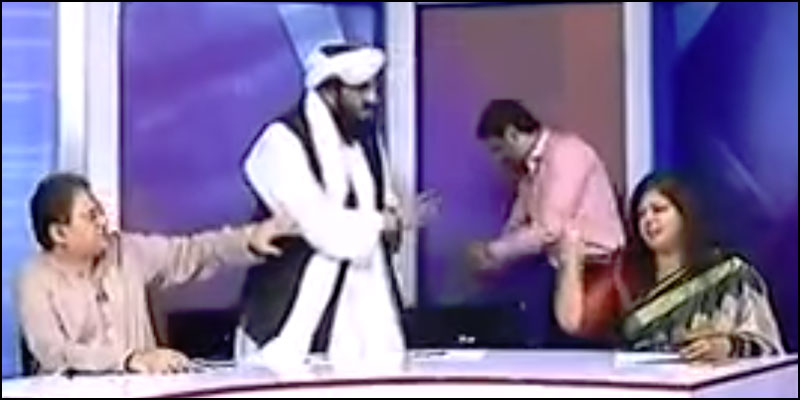At a large public gathering, Prime Minister Imran Khan referred to his rival, Bilawal Bhutto Zardari, as “shahiba” (ma’am). “I wasn’t handed over the party due to my mother,” he said, to the amusement of male bystanders, “I worked my way to the top.”
Even today, sexism, at the highest levels of power, is acceptable. But no single party can be held solely responsible. Misogynist and sexist commentary cuts across party lines in Pakistan.
Which politicians have given voice to some of the ugliest forms of sexism? Geo.tv lists down the most brazen and offensive rhetoric towards women:
'From behind the makeup will emerge Firdous Khan'
PML-N’s Talal Chaudhry targeted PTI’s Firdous Ashiq Awan, who is also the special assistant to the prime minister for information and broadcasting, by referring to her as a man.
Speaking into a camera he said: “If Firdous baji was to wash her face, the true her would come out from behind the makeup, meaning that instead of Firdous baji, Firdous Khan will emerge.”
After much outrage on social media, Chaudhry offered a half-hearted apology on Twitter.
However, later in the day on Muneeb Farooq’s talk show, he again made the same gendered slur towards Awan.
'The Zardari clan is a brave one'
Asad Umar, the former finance minister, in a speech to the national assembly, mocked Bilawal Bhutto Zardari for also taking his mother’s surname, instead of just his father’s: “The Zardari clan must be a brave clan in Sindh. I don’t know why they are ashamed of being Zardaris. They don’t want people to remind them that they are Zardari. But we will call them Zardari.
'Will make Nargis into Haji Nargis'
Fayaz ul Hasan Chohan, Punjab’s former minister for information, while addressing a crowd in Lahore, threatened Pakistani actresses Nargis and Megha. He said he would convert Nargis to “Haji Nargis” while he will force Megha to fast for 300 days, instead of the religiously ascribed 30 days.
'If women don’t talk they will fall ill'
Khursheed Ahmed Shah, a senior leader of the Pakistan People’s Party, took a jibe at the female lawmakers. He told the speaker to not refrain female parliamentarians from talking, when they are sitting together. “If women don’t talk, they will fall ill.”
'Tractor trolley'
Khawaja Asif, the former foreign minister, and a senior leader of the Pakistan Muslim League-N, called Shireen Mazari, a leader of the opposition party, “tractor trolley” for interjecting during his speech.
'A newly acquired dumper'
After Firdous Ashiq Awan joined the Pakistan Tehreek-e-Insaf, Khawaja Asif cast a slur at the female politician. He tweeted: “There is silver lining for Imran Khan, tractor trolley and newly acquired dumper can be used for hauling political garbage.”
'I told her there is nothing to touch anyways'
Shireen Mazari was again the target of another Pakistan Muslim League-N leader, Abid Sher Ali, who during a rally in his hometown said that Mazari had asked him to keep a distance from her, to which he told her: “But there is nothing to touch anyways.”
'What their relationship is with Imran Khan'
Mian Javed Latif, a senior PML-N leader, while talking to the media derided Murad Saeed, a member of the PTI, and his family. Latif said, in front of a press gaggle, "He [Murad] has two young sisters and I don’t want to comment on what their relationship is with Imran Khan."
'Sloganeering like a woman'
Former president Pervez Musharraf, while talking to a TV host, said Bilawal Bhutto Zardari was sloganeering like “a woman”. He further added that “tell him to act like a man first.”
'You are not like those PTI women'
Prior to the elections, Nawaz Sharif, who was the prime minister at the time, addressed the women in the public gathering. "Thankfully you are not like the women who attend PTI rallies."
Back in the 90s, Sharif would frequently target Benazir Bhutto, the former prime minister, with vulgar and demeaning comments. At one point, when she showed up in a yellow outfit to the parliament he called her a “yellow taxi” and threw a few expletives at her.
'It shows what families these women belong to'
Rana Sanaullah, the former law minister of Punjab, echoed Sharif’s words and criticized the women attending a PTI protest in Islamabad. “The dance moves of these women show which kind of families they belong to,” he said.

Physical and verbal assault
Hafiz Hamdullah, a senior leader of the JUI-F, verbally abused senior journalist, Marvi Sirmed, and tried to attack her, during a live TV broadcast.
'They get themselves raped for Canadian visas'
Pervez Musharraf, who was the president then, told the Washington Post, when talking about the Mukhtara Mai case: “You must understand the environment in Pakistan. This has become a money-making concern. A lot of people say if you want to go abroad and get a visa for Canada or citizenship and be a millionaire, get yourself raped."


